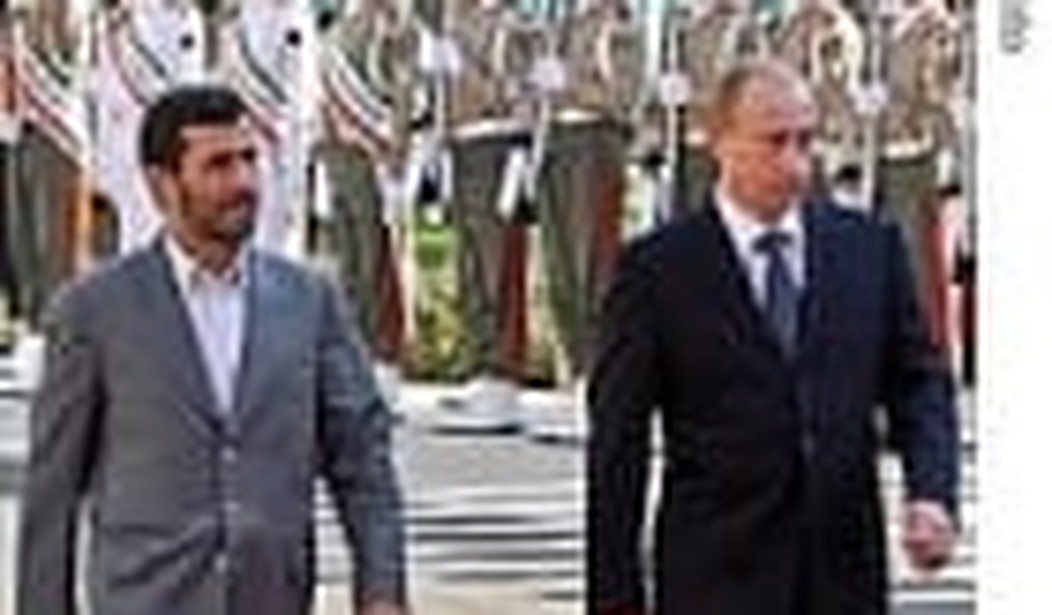Hosting the first Russian presidential visit to Iran since 1943 seems to have made Iranian president Mahmoud Ahmadinejad very happy.*
Ironic, since Ahmadinejad despised the Soviet Union. So much so that during the planning stages of takeover of the US embassy in November 1979, he called for the Soviet Embassy to be taken over as well. Obviously, thrilled at the respectability of hosting his highest level visitor to date, he decided to ignore the fact that he was sitting next to a former KGB agent, at least on the surface.
The visit was beautifully timed for the Iranian president.
Ahmadinejad’s internal popularity has taken a battering since his extremely unpopular fuel rationing program was introduced at the end of June, while externally, his belligerent talk against the West resulted in increased isolation of Iran.
With this visit, his camp wanted to show their opponents that the President is a man who still commands international respect,and his importance must not be taken lightly. Their preparation plans hit an initial setback when newspaper reports from Russia suggested that Putin was threatened with a suicide assassination attack during his visit.
As soon as the report was published, Iran’s diplomatic corp went into overdrive and started a multifaceted campaign to deny such reports, while reassuring the Russian authorities that the Putin will be given the highest level of security. Once Putin’s administration was satisfied with the arrangements, Iran’s media and even some officials began to overflow with inflated speculation regarding the achievements which Iran stands to gain from the visit.
This was first demonstrated when Iran’s Foreign Ministry spokesman, Mohammad-Ali Hosseini breathlessly promised that “pleasant news would be released soon on the fate of Iran’s nuclear power plant in the southern city of Bushehr”. Other Iranian news agencies such as Asr Iran reported that during Putin’s visit, it was expected that Russia will sign an agreement to supply Iran with 50 RD-33 jet engines, which Iran needs for its new generation of locally produced fighter aircraft.
Yet the visit did not produce any of these predicted results. Putin refused to give any assurances about when the $1 billion nuclear plant in Bushehr will be completed – when Russia might supply the nuclear fuel it needs. He also didn’t sign any agreement for the sale of Russian weapons or jet systems.
All that Iran really received from his visit was a statement that none of the Caspian Sea states (comprising of Iran, Russia, Kazakhstan, Azerbaijan and Turkmenistan) should allow a third country to use its territory for an attack against one of the member countries. This in itself is not saying much, because the US and Israel, the two countries who are most likely to participate in any such attack, are unlikely to use the territory of any Caspian sea countries to get to Iran.
So in reality, apart from a boost to Ahmadinejad’s image, this summit did not bring any concrete acheivement for Iran and its benefit was a one-way street.
Putin used this visit to boost his own image and standing especially with the United States by emphasising his influence over Iran — while avoiding harsh condemnation by not giving Tehran what it wants. Putin sent a clear message to Washington that Russia is an important international player, not only in the energy sphere, but also in the diplomatic field as well.
Some analysts in the Western have condemned Putin for visiting Ahmadinejad. They should do the opposite. Putin should be praised.
By going all the way to Tehran, and yet refusing to give any commitment for the completion of the Bushehr power plant, he sent a clear message to Ahmadinejad that the international community still refuses to believe his claims that Iran’s nuclear program is only for civilian purposes. Furthermore, until today, the Iranian government has continuously stated that only talks can resolve the disputes surrounding Iran’s nuclear program. By going all the way to Tehran, and having high level meetings with Ahmadinejad and Iran’s supreme leader Ali Khamenei, Putin has managed to call the Iranian government’s bluff.
In a single move, Putin showed that direct talks are not enough. To make real progress with the international community, the Tehran administration needs to take concrete steps. Since Russia is one of Iran’s major trading partners in sensitive areas such as defence and transportation, therefore it is unlikely that the importance of such a message will be lost on the Iranian leadership.
*This and all links in Farsi
Meir Javedanfar is the co-author of “The Nuclear Sphinx of Tehran – Mahmoud Ahmadinejad and the State of Iran.” He runs Middle East Economic and Political Analysis (Meepas)








Join the conversation as a VIP Member